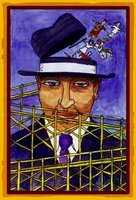Sandbox Lessons

I was listening to the song, “You’ve Got to be Carefully Taught” from the musical South Pacific. The song asserts that children are not born racist, they must learn to be racist. I think that same truth applies to ableism. Children are not born believing that some differences make a person inferior; they have to be taught. It's easy to see how Jerry Lewis’s Muscular Dystrophy Telethon, inaccessible buildings, overt discrimination, or the common use of words such as "retard" or "cripple" teach ableism. It is more challenging to realize that even well-intentioned people, themselves products of the culture we live in, can inadvertently foster the ableist paradigm in children.
My mom remembers a telling story that took place on an ordinary day many years ago. My two sisters and I were about 4 years old at the time (we’re triplets) and were playing in our backyard sandbox. It was a warm, sunny summer afternoon. My sisters were running back and forth between the sandbox and the hose to get water for our sandcastles. I was lying on my stomach, as I often did, playing in the sand with my hands, my shovel, and my truck. We were laughing and having fun.
Unbeknownst to my sisters and me, a six year old boy who was visiting our next door neighbors was intently watching us through the chain link fence.
At some point, one of my sisters went near the fence, and the boy asked her, “Does he walk?”
My mom says she held her breath, ready to jump into the conversation and stand up for me. Ever the advocate, she would've said something sappy like, “He can’t walk, but he's really good at playing in the sand.”
Had my protective grandparents been around, one of them might have scolded the boy, “Hey! That’s a rude question!”
An educator or social worker, seeing a potential peer socialization experience for me, might have answered with a heavy, deliberate sigh, “No… he's not able to walk.” Then with forced enthusiasm, “Why don't you go play with him? It doesn't have to be very long, just a few minutes. You'll feel good helping the boy."
A healthcare provider, intending to minimize the importance of physical differences, might have lectured the boy on my condition of cerebral palsy, "The motor area of his brain was damaged because he was born too early. This damage causes him not to have good control of his arms and legs. Even though his body is different from our bodies, he's really just like us.”
The boy's dad, not wanting his son to be offensive or rude, might have pulled his son away from the fence, “Shhh…. Don't stare! Don't make him feel bad."
On the surface, these responses to the boy's question may seem appropriate. But imagine, if you will, the boy at the fence asking my sister a different question. Suppose he asked, "does he have red hair?"
"No, he doesn't, but he's really good at playing in the sand."
"Hey! That's a rude question!"
Heavy sigh, “No… he doesn't have red hair.” Forced enthusiasm, “Why don't you go play with him? It doesn't have to be very long, just a few minutes. You'll feel good helping the boy."
"He’s genetically heterozygous for the brown haired trait. Even though his body is different from our bodies, he's really just like us.”
“Shhh…. Don't stare! Don't make him feel bad."
So, how did the four year old's and six year old’s interaction play out that sunny summer day?
Not assuming any hidden meaning to the boy’s “Does he walk?", my sister simply said, "no."
The boy accepted her simple answer to his simple question. Then he moved on to his more important question, "Can I play? We could use my yellow dump truck to move the sand.”
The boy, and soon the neighbor kids, came over. The sand castles got bigger, the laughter louder. We all had a great time.
Be sure to check out the many other posts for Blogging Against Disablism Day. Thanks, Goldfish for organizing this event.
















